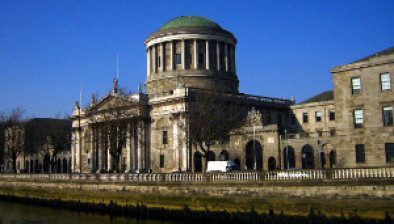High Court: No injunction to restrain dismissal of recruit prison officer

The High Court has refused to grant injunctive relief restraining the dismissal of a recruit prison officer arising from a discovery of plastic bags which tested positive for cocaine in his training accommodation.

About this case:
- Citation:[2023] IEHC 706
- Judgment:
- Court:High Court
- Judge:Mr Justice Rory Mulcahy
Delivering judgment for the High Court, Mr Justice Rory Mulcahy determined: “Compliance with contractual provisions is, at the very least, a strong indicator that fair procedures have been afforded. In order to establish that despite such compliance, there has, nonetheless, been a breach of fair procedures… it would be necessary to establish some exceptional feature, or at least something sufficiently out of the ordinary, which resulted in the contractual entitlements being inadequate to ensure fair procedures.”
Background
Mr Campbell began working as a recruit prison officer on 25 April 2022. His 12-month probationary contract was subject to the Civil Service Regulation Acts 1956 to 2005. He trained in Portlaoise Prison where he was provided with accommodation in a single room.
The room was inspected for damage following his departure on 3 June 2022, and was subjected to a ‘deep clean’ on 9 June 2022 during which plastic bags containing white residue were found in the bedside locker. Mr Campbell and An Garda Síochána were notified. By email dated 15 November 2022, gardaí confirmed to the prison service that the substance had been identified as cocaine by Forensic Science Ireland.
On 31 January 2023, terms of reference were sent to Mr Campbell setting out the allegations, a summary of the evidence and, erroneously, that the disciplinary procedure would be conducted under Circular No. 19/2016, Civil Service Disciplinary Code. He was invited to interview at Cloverhill Prison on 8 February 2023.
On that date, Mr Campbell requested an adjournment and was shown CCTV footage. He attended for interview on 22 February 2023, and was informed that he was mistakenly provided with Circular 19/2016 instead of Circular 4/2019. Mr Campbell was told that the disciplinary would instead be conducted under the latter and revised terms were provided to him.
A second meeting took place on 20 March 2023 to address issues which Mr Campbell had not referenced during the first meeting. The investigating officer later produced an investigation report containing conclusions including that Mr Campbell possessed the bags and had consumed an illegal substance whilst training, amounting to serious misconduct.
Mr Campbell was then requested by letter to attend a disciplinary meeting on 13 April 2023. The letter set out the issues to be considered, and that Mr Campbell would be afforded an opportunity to respond, to raise concerns and to present mitigating circumstances or evidence. He was advised of his right to representation by a civil servant or an official of the Prison Officers’ Association.
On 12 April 2023, Mr Campbell’s solicitor raised concerns about the change in procedure, and the governor conducting the disciplinary hearing clarified the change by reply on 13 April 2023, stating an intention to proceed with the hearing. The hearing took place as scheduled with Mr Campbell accompanied by a representative from the Prison Officers’ Association.
Mr Campbell was subsequently informed that there had been serious misconduct on his part and that a recommendation for his termination had been made, which he was entitled to appeal.
Following the hearing of his appeal, Mr Campbell was notified that the recommendation for his termination had been upheld, and on 13 June 2023 he was notified of the decision to dismiss him, to take effect on 20 June 2023.
On 16 June 2023, Mr Campbell obtained an order restraining the defendants from terminating his employment until after 20 June 2023, which was continued by consent pending the hearing of an application to restrain his dismissal and to have him reinstated to full duties pending the determination of the proceedings.
The High Court
Mr Justice Mulcahy set out the principles governing interlocutory injunctions, highlighting that to secure relief preventing the termination of an employment relationship, “it is necessary to establish not just a fair issue to be tried but a strong case likely to succeed at hearing” as per Maha Lingam v HSE [2005] IESC 89.
Turning to Mr Campbell’s complaint concerning the change of procedure to that in Circular 4/2019, the court noted that no argument was advanced that Circular 4/2019 did not apply to his position, and that the main difference was that Circular 04/2019 did not provide for an investigative procedure, observing that by the time of the notification concerning the change in procedure, the investigative procedure had already occurred.
The court pointed out that “the actions of the Defendants in commencing the disciplinary process under the incorrect procedure but ‘mending their hand’ during the course thereof illustrate the reason why courts should be reluctant to intervene during disciplinary proceedings. Despite the apparent misstep…the process hadn’t gone so irredeemably wrong that the procedure couldn’t be completed without affording the Plaintiff the benefit of the procedure to which he was entitled.”
Mr Justice Mulcahy emphasised that where contractual provisions had been complied with, an exceptional feature, “or at least something sufficiently out of the ordinary” resulting in contractual entitlements being inadequate to ensure fair procedures would need to be demonstrated.
Mr Campbell complained that he was not afforded a fair opportunity to test the evidence against him, and that given the seriousness of the matter, he should have been entitled to legal representation, to cross-examine witnesses, to have the plastic bags tested and to review all CCTV footage available.
The court stated that whilst the allegations were clearly serious, it did not mean that legal representation was necessary to ensure a fair hearing in the absence of complex legal issues and allegations resting on the credibility of particular witnesses or disputed evidence. The judge considered that “the Plaintiff appears to have been provided with a procedure, at least in this respect, which was capable of being conducted fairly, but did not seek to exercise all his entitlements in that procedure”.
Addressing the complaint that Mr Campbell should have been given all of the CCTV footage to review, the court decided that there was no strong case for a want of fair procedures in the defendants’ reliance on the Chief Officer’s review of the footage in the disciplinary proceedings, and that “the approach taken was a reasonable one. The Plaintiff has not identified any basis for doubting the credibility or impartiality of the Chief Officer evidence…”
Turning to the suggestion that Mr Campbell should have been provided with the plastic bags so that he could have them tested, Mr Justice Mulcahy found that the defendants were entitled to rely on the gardaí’s confirmation, as to require more would “import criminal standards into disciplinary proceedings…”
The court was equally unimpressed by Mr Campbell’s remaining complaints, including his assertion that the criminal standard of proof should have been applied by the defendants with regard to the nature of the allegations made, a matter which the judge considered to be a “mischaracterisation” of Georgopoulus v Beaumont Hospital Board [1998] 3 IR 132 and O’Laoire v Medical Council, unreported, Supreme Court, 25 July 1997.
Conclusion
Accordingly, the court refused to grant injunctive relief on the basis that Mr Campbell did not meet the threshold of a strong case likely to succeed.
Campbell v The Irish Prison Service & Anor [2023] IEHC 706









